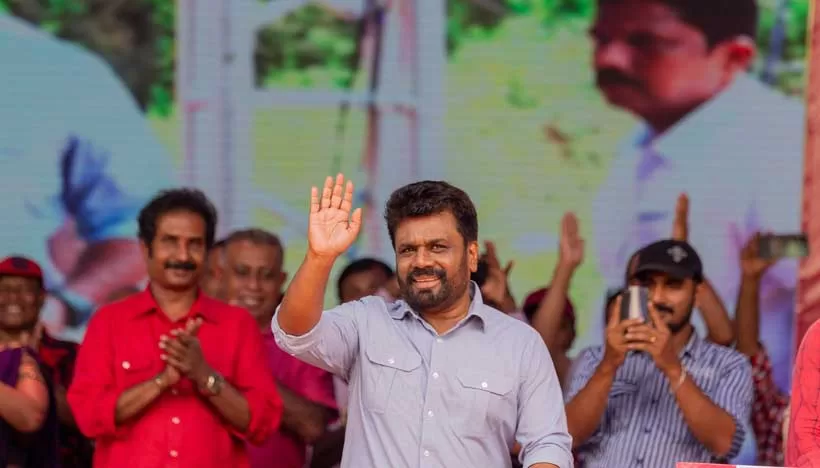Sri Lanka’s 2024 presidential election shows a pivotal moment in the country’s political scene through the win of Anura Kumara Dissanayake. His victory, a definitive cry for reform, recapitulates the public’s disenchantment with the earlier governments and its failure to address the national debt. Leading left-leaning National People’s Power (NPP) coalition member Dissanayake bills himself as a reformer dedicated to bringing stability back and combating the ingrained corruption that has endangered the nation for decades.
The outcome of the election is a definite rejection of conventional political elites who failed to reduce the suffering of common Sri Lankans even after several terms in government. After Gotabaya Rajapaksa was ousted during considerable demonstrations in 2022, temporary president Ranil Wickremesinghe was able to pacify the nation momentarily but lost popular trust. Though required to get bailout money, his stringent austerity policies alienated the working class and left supporters yearning for a leader able to provide fair economic recovery.
Dissanayake’s triumph signifies a dramatic change. He has promised to renegotiate aspects of the IMF agreement to lessen the impact of austerity on the underprivileged, cut inflation, and change the tax code, disproportionately affecting the middle and lower classes. Although the financial difficulties are overwhelming, Dissanayake’s dedication to openness, anti-corruption, and social justice speaks to people who have suffered from ineffective government for too long.
Dissanayake lost little time in acting boldly once he took government. His quick dismissal of Parliament and demand for November 2024 snap elections point to his keen will to get a solid mandate to carry out his reform plan. Moreover, the choice of Harini Amarasudiya as prime minister, the first woman to occupy the post in more than two decades, shows a dedication to diversity and modern government.
Promising indicators of a forthcoming economic rebound abound already. Stricter monetary policies and global economic stabilization are helping to lower the recently rising inflation. The long-term viability of Dissanayake’s economic plan depends on his government’s capacity to match the demands of the Sri Lankan people with IMF expectations.
The geopolitical scene of Sri Lanka and domestic political issues depend much on Dissanayake’s administration. Being at the junction of India, China, and the larger Indo-Pacific area, Sri Lanka participates in the strategic rivalry among world nations. Under his Neighbourhood First approach, Dissanayake has underlined his will to have close connections with India, therefore offering a hand of friendship. Quickly welcoming the incoming president, Indian Prime Minister Narendra Modi expressed hope about strengthening bilateral relations.
Dissanayake has also addressed worries about Sri Lanka’s ties to China. Washington and New Delhi’s charges that his NPP receives Chinese money have drawn scrutiny. Emphasizing his dedication to Sri Lankan sovereignty, Dissanayake has often refuted these assertions. Ensuring Sri Lanka’s long-term security and autonomy depends on his capacity to negotiate the convoluted geopolitical terrain while juggling ties to China, India, and the United States.
Though there is much hope for Dissanayake’s election, obstacles abound on her path forward. The Sri Lankan economy is still delicate. Hence, any mistake in renegotiating the IMF agreement can cause investor confidence to drop. Political resistance from the political parties, especially the Samagi Jana Balawegaya (SJB) and the Sri Lanka Podujana Peramuna (SLPP), will also probably get more intense as Dissanayake tries to destroy ingrained institutions of power.
Furthermore, although his pledge to combat corruption has attracted many followers, eradicating ingrained corrupt practices inside the political and bureaucratic systems will prove challenging. Dissanayake’s performance will set a standard for his government, guiding his capacity to maintain popular support in the coming years.
Anura Kumara Dissanayake’s election to lead Sri Lanka marks a turning point in the nation’s history. This is a win for those pushing reform, transparency, and social justice. However, it also prepares one of the most difficult presidencies in recent memory. Keeping his vow to overhaul Sri Lanka’s dysfunctional political system, the incoming president must negotiate internal economic recovery and the sensitive geopolitical pressures from world powers.
The leadership of Dissanayake will be tested in the following months. Whether his term as president marks the beginning of a new chapter for Sri Lanka will rely on his ability to generate actual economic improvements, restore public trust in the government, and maintain the sovereignty of Sri Lanka in a demanding international environment.
